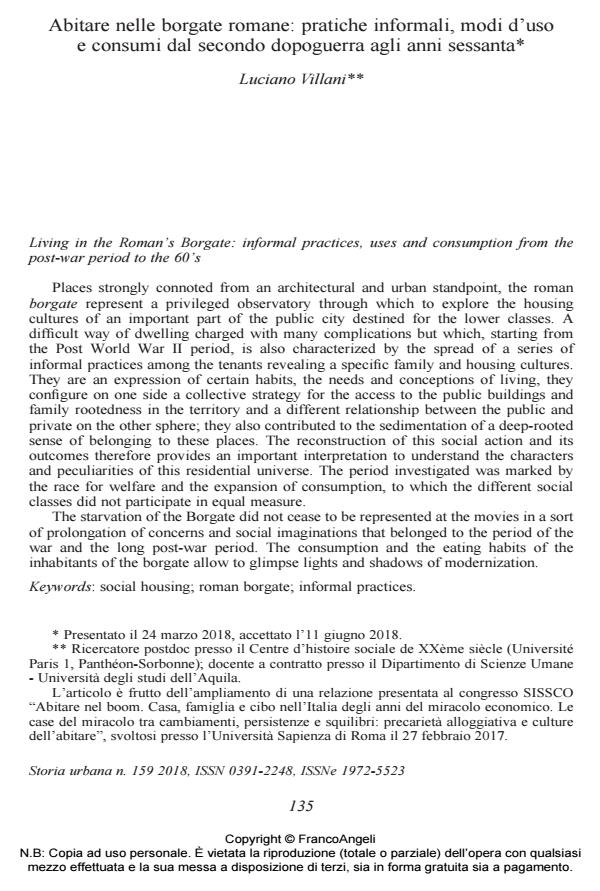Living in the Roman’s Borgate: informal practices, uses and consumption from the post-war period to the 60’s
Journal title STORIA URBANA
Author/s Luciano Villani
Publishing Year 2018 Issue 2018/159
Language Italian Pages 30 P. 135-164 File size 295 KB
DOI 10.3280/SU2018-159006
DOI is like a bar code for intellectual property: to have more infomation
click here
Below, you can see the article first page
If you want to buy this article in PDF format, you can do it, following the instructions to buy download credits

FrancoAngeli is member of Publishers International Linking Association, Inc (PILA), a not-for-profit association which run the CrossRef service enabling links to and from online scholarly content.
Places strongly connoted from an architectural and urban standpoint, the roman borgate represent a privileged observatory through which to explore the housing cultures of an important part of the public city destined for the lower classes. A difficult way of dwelling charged with many complications but which, starting from the Post World War II period, is also characterized by the spread of a series of informal practices among the tenants revealing a specific family and housing cultures. They are an expression of certain habits, the needs and conceptions of living, they configure on one side a collective strategy for the access to the public buildings and family rootedness in the territory and a different relationship between the public and private on the other sphere; they also contributed to the sedimentation of a deep-rooted sense of belonging to these places. The reconstruction of this social action and its outcomes therefore provides an important interpretation to understand the characters and peculiarities of this residential universe. The period investigated was marked by the race for welfare and the expansion of consumption, to which the different social classes did not participate in equal measure. The starvation of the Borgate did not cease to be represented at the movies in a sort of prolongation of concerns and social imaginations that belonged to the period of the war and the long post-war period. The consumption and the eating habits of the inhabitants of the borgate allow to glimpse lights and shadows of modernization.
Keywords: Social housing; roman borgate; informal practices
- Ownership and control of Italian banks: A short inquiry into the roots of the current context Leonardo Giani, in Corporate Ownership and Control /2008 pp.87
DOI: 10.22495/cocv6i1p9 - Path-dependency and corporate governance in Italy: The political origins of debt financing Antonio Nicita, Riccardo Vannini, in Corporate Ownership and Control /2007 pp.92
DOI: 10.22495/cocv4i4c4p8
Luciano Villani, Abitare nelle borgate romane: pratiche informali, modi d’uso e consumi dal secondo dopoguerra agli anni sessanta in "STORIA URBANA " 159/2018, pp 135-164, DOI: 10.3280/SU2018-159006